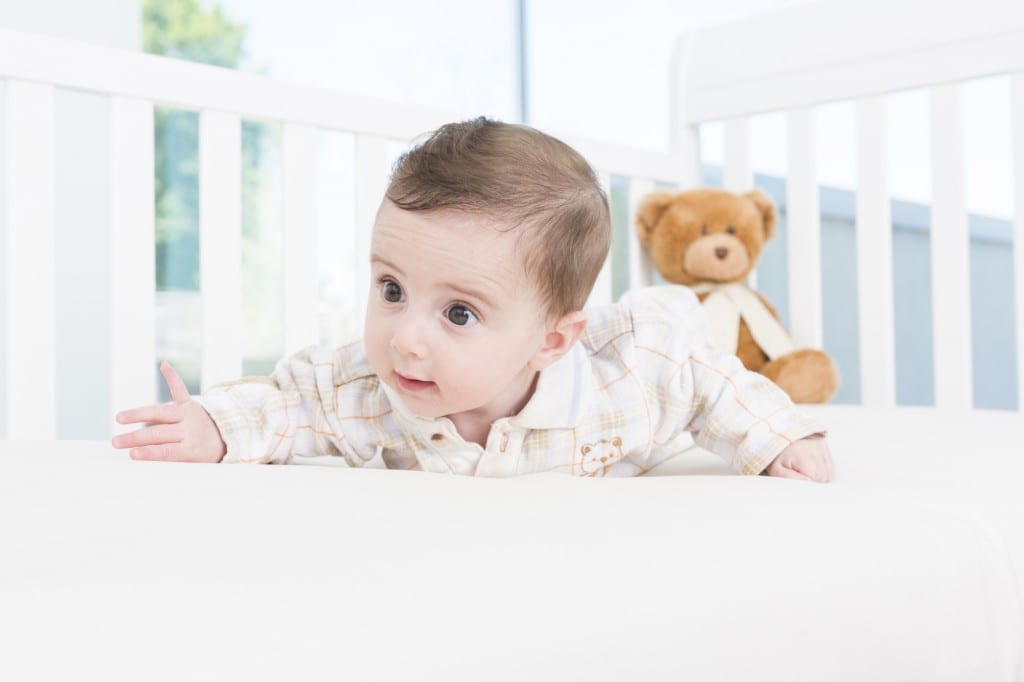When you’re getting ready for your baby, you’re sure to start thinking of all the nursery gear you’ll need, like a crib, changing table, diaper pail and a rocking chair. The last item you’re going to remember is probably a crib mattress. It’s certainly not the most exciting purchase you’ll make, but it’s one of the most important. Instead of treating it like an afterthought, take your time choosing a quality mattress that’s good for you and your baby.
What’s so important about a mattress?
Simply stated, your baby is going to be spending a lot of time in his or her crib. Good mattresses make bedtime better for babies. That’s definitely a bonus for you, too! They also help support your baby’s body as he or she grows. Unlike child or adult mattresses, baby mattresses should be very firm. Soft sleeping surfaces can pose suffocation hazards and increase your baby’s risk of sudden infant death syndrome.
What kinds of mattresses are there?
Crib mattresses come in foam and innerspring models. Foam mattresses are usually less expensive, anywhere from $30 to $100, and come in a range of thicknesses and densities. Thickness is a personal preference, but look for high-density foam if you go this route. Heavier foam mattresses are denser than lighter ones of the same size. Test foam mattresses before buying them by pressing your hand into the center of the mattress. It will form an indent, and this indent should fade quickly in good mattresses. If it doesn’t, it could prevent your baby from changing positions during sleep.
Innerspring mattresses are usually more expensive – in the $100 to $250 range – and they’re often more durable. Innerspring mattresses with more coils are generally firmer. The gauge of the wire also plays a role. Lower gauges mean thicker wire, which can also lead to a firmer mattress. Look for a mattress with 135 or more coils and a gauge lower than 15.5.
What about organic mattresses?
Finally, your last choice is to decide if you want an organic mattress. Yes – certified-organic mattresses made of organic cotton or all-natural wool are more expensive, however, they can really be worth the peace of mind. They don’t contain the chemicals and industrial compounds that some parents think could result in the emission of toxic gases or allergic reactions in infants. Flame retardants known as PBDE (polybrominated diphenyl ethers), vinyl and polyurethane foam, for instance, may emit toxic gases.
Look for a GREENGUARD certification, which measures the chemical emissions from the mattress. If a model is certified, an outside laboratory tested it to see if it poses an air-quality risk to your baby. Oeko-Tex Standard 100 certification can also assure you that certain PBDEs and heavy metals aren’t present in the mattress.
If you don’t buy a mattress that’s certified, leave it in a dry place outside for a few days to let off-gassing occur. This allows any noxious compounds to evaporate before you bring it into your home.
What else should you look for in a mattress?
Size, venting and a mattress cover are other features to keep in mind. You’ll want a mattress that fits snugly into your baby’s crib, with no more than two finger widths between the mattress and the wall or crib to prevent suffocation or entrapment. Look for vent holes in the sides of the mattress too which will allow air to flow through the mattress. If there’s ever a diaper leak, you’ll be glad it’s there.
Mattress covers are also crucial. Look for double- or triple-laminated nylon covers for the best protection.
Is it OK to buy it used?
There’s nothing wrong with buying a used mattress, but you have to know its previous environment and whether a mattress cover was used. If you’re unsure, better buy new since recent research has found an association between used mattresses and an increased risk of SIDS. Bacteria and fungus are big concerns with used mattresses, so unless you know one was well protected and you can change the cover, don’t use it.
